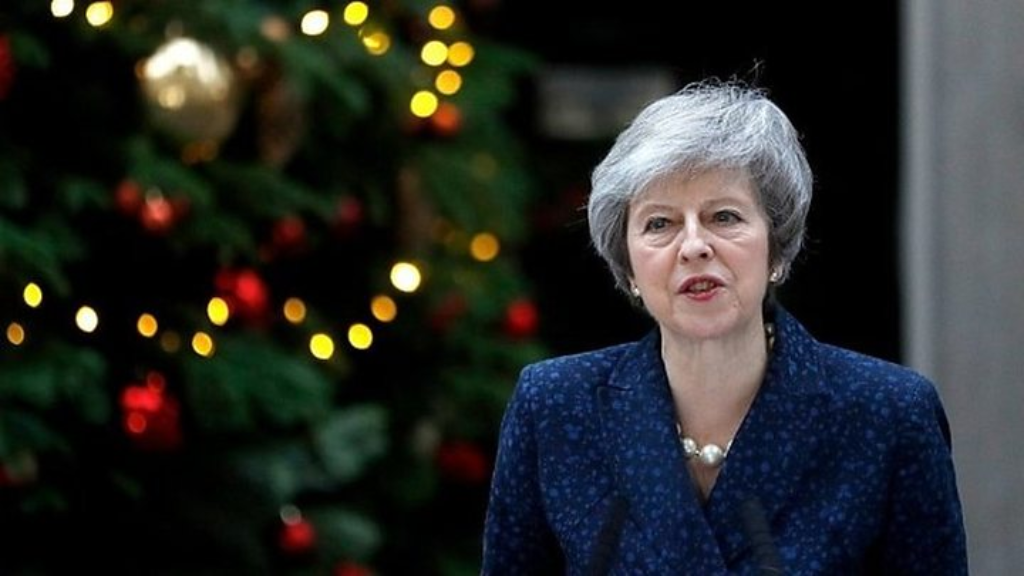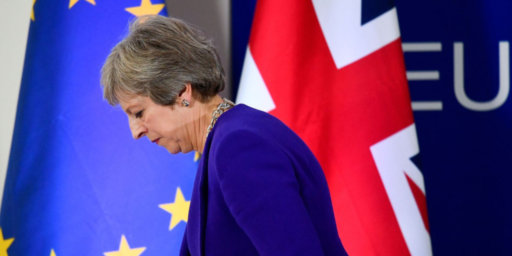Theresa May Survives Tory No Confidence Vote
British Prime Minister Theresa May survived an intra-party leadership challenge, but her political position is still far from secure.

British Prime Minister Theresa May has survived a no-confidence challenge from within her own party, and while this may temporarily strengthen her hand politically, she still faces doubts and obstacles regarding her plan for Great Britain’s exit from the European Union:
LONDON — Britain’s prime minister, Theresa May, survived the gravest threat yet to her embattled leadership on Wednesday, winning a confidence motion called by Conservative Party lawmakers angry at her handling of the country’s troubled departure from the European Union.
But the victory celebration, if any, is likely to be short-lived. While Mrs. May survived to fight another day, her win did nothing to alter the parliamentary arithmetic that forced her this week to delay a critical vote on her plan for withdrawal from the European Union, or Brexit.
John Springford, deputy director of the Center for European Reform, a London-based research institute, said that the size of the vote against her “is an even clearer signal that she won’t be able to get her deal through Parliament, and makes it even more likely that when she puts the deal to the vote she will lose that.”
Mrs. May won the support of 200 Conservative lawmakers, while 117 voted against her.
She won only after promising that she would step aside soon after the Brexit agonies were over, according to reports from a meeting of Conservative Party lawmakers preceding the vote. That removed the generally unwelcome possibility that she would stand as party leader in the next general election.
One Conservative lawmaker, George Freeman, said that Mrs. May had made clear “that she has listened, heard and respects the will of the party that once she has delivered an orderly Brexit, she will step aside for the election of a new leader.”
Players on all sides of the Brexit mess breathed a sigh of relief at Mrs. May’s victory. Under the Conservative Party’s rules, she cannot be challenged again by her own lawmakers for another year, which at least offers some stability for moving the plan forward. Had she lost, the Conservatives would have been thrust into a divisive, drawn out process that would have stretched well into the next month and threatened the country’s ability to reach a deal by the March deadline.
The ultimate choice of prime minister would have been left to the 120,000 Conservative Party activists who generally seem to favor a clean break with the European Union, even if that means the messy, potentially disastrous prospect of a no-deal Brexit.
Nevertheless the victory came at a price, laying bare the opposition within her own party ranks to Mrs. May, who leads a government that has no parliamentary majority, and whose Brexit plans are in limbo.
The confidence vote was called early Wednesday when, after weeks of discord, at least 48 Conservative lawmakers submitted the letters of protest required to force it. Mrs. May canceled a trip to Dublin where she had hoped to talk to her Irish counterpart, Leo Varadkar, about changes that might help build support in the British Parliament for her Brexit proposals.
But it had already been clear that she was in deep political trouble, battered from multiple directions by her management of the European Union withdrawal. In particular, many hard-line Brexit supporters within her party believed she was not making a complete enough break with the bloc.
At least in the short-term, this is a win for May due to the fact that, under Conservative Party rules, she can not face an internal leadership challenge again for another year. At least for the time being, this means that May is secure in her position as party leader and Prime Minister, but that position is far less secure than it might seem from the outside. For one thing, the fact that May was forced to face an intra-party no-confidence vote at this point in the Brexit process is a sign of just how weak the support for her Brexit deal is in Parliament, which is, of course, the reason that she decided to postpone the vote in the House of Commons for the time being. Additionally, it’s the reason she went to the Continent yesterday in what can only be described as an obsequious and rather disastrous attempt to get, well, something from the E.U. in the form of additional concessions that she can take back to her party to shore up support for her Brexit plan.
With this result and the fact that 117 Tory MPs voted against her, it seems apparent that she still does not have the votes she needs to get her deal through Parliament. This means that, if the United Kingdom is going to go through with Brexit it is going to end up being a no-deal “hard” Brexit that will cause headaches for the United Kingdom for years to come and will leave unresolved issues ranging from the Irish border issue to the payments that European Union is entitled to under the terms of Article 50 of the E.U. Treaty upon the United Kingdom’s exit from the Union. It’s also worth noting that the win today may at least in some respect be due to the fact that she promised that she would not stand as leader of the Conservative Party at the next scheduled election in 2022. So while May won tonight and has at least been temporarily strengthened inside the Conservative Party, May’s political future is arguably weaker in the long-term and the future of Brexit is no more certain than it was at the beginning of the week.





Is there any likelihood of “do over” referendum?
Do the Tories not see this as an electoral death sentence? I get the hardcore people are hardcore for Brexit, but do other, more strategic folk not see this as a guaranteed generation in the wasteland moment?
Why is Labour so seemingly ineffective on this issue?
@de stijl: Not very strong comparisons, but
Aren’t Republicans silent on trade wars because the GOP base is fine with Trump’s “trade wars are easy to win” bullshit? Are Republicans coming out for repealing the corporate tax cut because of the damage the deficit and faster growing debt will do to their constituencies?
From what I have heard, leaders in Labour are just as jingoistic as Tories on this subject. Brexit crosses political divides there that we have no counterpart for here.
For one last potential roadblock, some British pundits are noting that Brexit is no more likely to fail (in real terms) if a new referendum is called for. John SF or somebody was talking about that on an earlier thread on this topic IIRC.
@de stijl, it’s just complete deadlock on all sides. The majority of Tory MPs in parliament voted Remain, but they know the majority of their own members and voters went for Leave, so their position is to honor the result whilst doing it in the least economically damaging way (a deal of some sort). But there’s a wrecking minority of at least 115 or so of their MPs who are hardcore for Brexit and happy to crash out without a deal.
On the other side, you’ve got a Labour leader who is far, far to the left of most of his MPs (by 170 to 40 they voted no confidence in him in 2016, straight after the referendum, angered by his less than fulsome support for Remain), but who they can’t get rid of because he’s really popular with the 500k+ Labour members, who are the ones who vote the leader. They’re also largely Remain, but won’t vote for May’s deal because it’s a Tory government who proposed it, and they think there’s some magic scenario where they force an election even though they don’t have the numbers, and negotiate their own magic deal (the leadership position) or somehow force a 2nd referendum, even though they don’t have the numbers (the position of a number of Remain Labour MPs).
This is how you get the tragi-comic situation of a Parliament with a big majority against no-deal Brexit grinding it’s way towards facilitating no-deal Brexit by accident…
@de stijl:
Summoned, I appear!
Three parts to follow:
First topic: Referendum Fun!
Likelihood of a 2nd referendum, still not over 50:50 IMHO.
Most “true believer” Leavers are determined to avoid one
Most moderate Leavers are against at present
Remainers are split between:
– those think the 2016 referendum result should be respected (whether on principle or on prudential grounds) who want to make the best of a bad job via an EEA/CU membership plan agreed with moderate Leavers,
– 2nd referendum (a.k.a. Peoples Vote) advocates
There have recently been some bad tempered disagreements between the two camps.
BTW there is also a (very minor) third group to which I belong: Parliament should assert itself, revoke, and tell the populists to stuff their damnable affection for referendums.
Diplomacy is not my strong suit 🙂
The problem is, though there is a cross-party majority of MPs against No Deal, and a (smaller) one against May’s deal, there is no solid majority for any alternative either.
May’s deal must fall first before other options become politically possible.
Being fully aware of this May is now intent on delaying such a vote as long as possible to run out the clock and leave no choice but her deal or no deal.
While May, her Cabinet, and supportive MPs hold the government, they have the power to stonewall any calls for a 2nd referendum, and if they did call one, to control the format (issues of questions posed, choices if multiple options, franchise, and campaign regulation would ALL be massively important and contentious).
And Leave still might win a second time.
Second Topic: Tory Insanity!
Most rational Conservative MPs realise that No Deal would be disastrous for the country and therefore the party; but think a deal of some sort mitigates damage enough to be bearable.
Even if they are out for a term post 2022, they suspect a Corbyn Labour government would be unpopular enough to let them recover.
Especially if Labour were to get blamed for the ongoing economic problems.
The rational Torys’ problem is that the ERG calculations are very different (varying mix of delusion, hatred, and mad libertarian schemes) and that the Conservative Party membership has become overwhelmingly Europhobe.
Openly defying the activists could be career-ending for many MPs.
Plus there is the calculation of election votes: while economic disaster could doom the Conservatives, so could a possible loss of Leaver votes, Con-Leavers to UKIP or successor, Lab-Leavers to UKIP &/or back to Labour.
Also, some pro-Remain Conservatives genuinely believe that the leave victory in the referendum should be honoured on principle.
What the balance of these motives is, only they know.
Hence the need for May’s deal to fall in Parliament before they can make a move to block No Deal and neuter the ERG.
Was going to make a third post re. Labour but Chris has already said it, better.
(And less long-windedly!)
It sounds good for May, but on the other hand the headline might read “May gets to prolong her agony indefinitely.”
I think the Brits are going to learn the hard way that “muddling through” doesn’t work when you’re falling off the cliff…
(They also have this obsession with assuming that “the other side is bluffing”. Historically this has landed them in a heap of trouble *cough Russia entering the other side on WWI cough* but they’ve never gotten over the habit.)
@JohnSF:
Are you a djinn? I do not recall rubbing any lamps earlier.
—
BTW, thanks for that backgrounder. I learned more from you than 20 news articles that are reporting this as if it were a horse race. @Chris: too. Thanks again!
@de stijl:
Djinn and tonic. 🙂